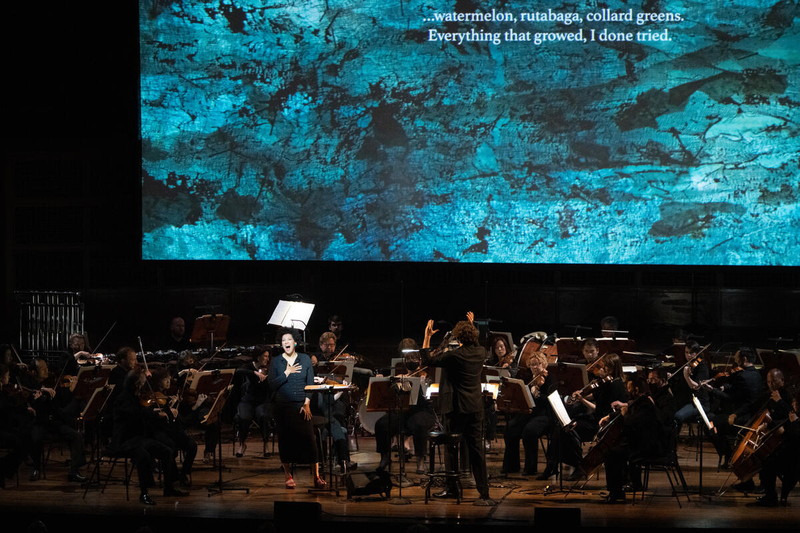
Black Women’s Creativity
Count on mezzo Julia Bullock to design a program quite unlike anything ever at the S.F. Symphony: a multimedia perusal of the history of black women in America, bravely breaking out of the mold, played before a largely white S.F. Symphony audience. By the end you were convinced you’d earned a credit toward a master’s degree in sociology. In the process a lot of long-gone readings by notable artists were brought back to life in a viable format.
The only element marring this cornucopia of recent compositions (by black women) was Bullock wearing a microphone and amplifying her voice, when we know that she has a voice of operatic proportions.
While Bullock sang with her radiant, all-embracing and uncommonly joyous voice and did readings from visual artists of the past, a wealth of original dynamic projections came from Hana S. Kim in an arresting concurrent light show, and recordings revived the spirit of artists of the past. In addition, an orchestra of at least 20 played on stage.
The song lyrics from a bygone century representing both the enslaved and the freed dealt with every-day concerns of the harried and overworked: The hard labor in the cotton fields, the alienation, the captivity, the love and care of small children, the quilting bees and the desperate cries out to the Almighty for sustenance and relief.
Song stylist Bullock threw herself into these with gusto, carrying off a complex program which at times featured her singing over a recitation. She has the rare vocal gift of bringing the most unlikely, unfamiliar repertory resoundingly to life, evoking comparisons to the great singer Jessye Norman (1945-2019).
Two world premieres from Carolyn Yarnell, “I Came up the Hard Way” and “Ain’t My Home,” included an extended orchestral interlude for an ensemble of strings with percussion in the former—the most memorable original creation of the night. Also new was Pamela Z’s “Quilt” blending early recorded voices with Bullock’s live song.
Other composers included Allison Loggins-Hull, the Cuban-born Tania León and Jessie Montgomery. Loggins-Hull’s lullaby featured a captivating set of wispy night songs in the orchestra.
Of note was the attendance by far more black patrons than normally seen at our symphony concerts.
As one of the SFS’ unusual “creative partners” of soloists and composers, Bullock came up with a winner. One would hope she’d repeat this program elsewhere, ideally adding an all-inclusive finale analogous to the lines of Beethoven’s Ode to Joy (“All humanity will be brothers”) to underline the broad impact of the messages, moving from the parochial to the universal in emphasis.
Conducting the orchestra animatedly was the German Christian Reif, who is also Bullock’s husband.
Appearing at the end May 17 to take a bow on stage were composers Yarnell, Loggins-Hull, and Z.
LATE NEWS—Expecting a child later this year, Bullock has withdrawn from the world-premiere role of Cleopatra in the S.F. Opera’s “Antony and Cleopatra” composed by John Adams. She is replaced by the New Zealand soprano Amina Edris.
JULIA BULLOCK in “History’s Persistent Voice” program, with members of the S.F. Symphony, and guest conductor Christin Reif , plus projections, recordings, May 17 at Davies Hall, S.F. For info: (415) 864-6000, or go online: www.sfsymphony.org.